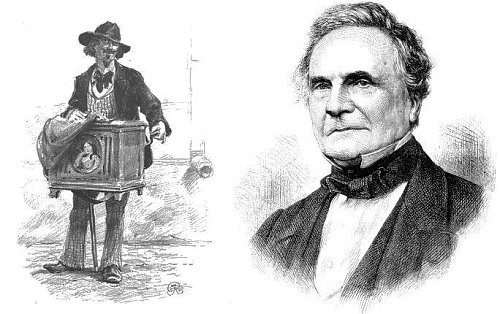gammerstang
n. a tall, awkward person, usually a woman
Month: April 2009
Quiet!

Charles Babbage hated organ grinders. Calling them the worst of the “thousand nuisances” that made it “impossible for the householder to enjoy any quiet,” he claimed that such “instruments of torture” had cost him a quarter of his working life. At one point he tallied 165 “nuisances” in 90 days.
“It is difficult to estimate the misery inflicted upon thousands of persons,” he wrote, “and the absolute pecuniary penalty imposed upon multitudes of intellectual workers by the loss of their time, destroyed by organ-grinders and other similar nuisances.”
He spent £170 on a soundproof room in his Cheyne Row house to protect him from “vile yellow Italians”; it didn’t work. When a magistrate asked if he really believed that listening to a hand organ could impair a man’s brain, he replied, “Certainly not, for the obvious reason that no man having a brain ever listened to street musicians.”
Sadly, he was as much renowned for this crusade as for his scientific accomplishments — his 1871 obituary in the London Times notes that he lived to be almost 80 “in spite of organ-grinding persecutions.”
Catálogo
A self-inventorying Spanish sentence, discovered/invented by Miguel Lerma of the Universidad Politecnica of Madrid:
Esta frase contiene exactamente doscientas treinta y cinco letras: veinte a’s, una b, dieciseis c’s, trece d’s, treinta e’s, dos f’s, una g, una h, diecinueve i’s, una j, una k, dos l’s, dos m’s, veintidos n’s, catorce o’s, una p, una q, diez r’s, treinta y tres s’s, diecinueve t’s, doce u’s, cinco v’s, una w, dos x’s, cuatro y’s, y dos z’s.
See also The Quick Brown Fox, Bills of Lading, and Inventory.
Conflict of Interest
Eric Temple Bell led two lives. By day he was a mathematician at Caltech; by night he wrote science fiction as John Taine.
By a happy chance the two personalities met in 1951, when the Pasadena Star-News asked Taine to review Bell’s book Mathematics, Queen and Servant of Science.
Not one to lose an opportunity, he accepted. “The last flap of the jacket says Bell ‘is perhaps mathematics’ greatest interpreter,'” Taine wrote. “Knowing the author well, the reviewer agrees.”
Just So You Know

GREAT CRESTED GREBE is typed entirely with the left hand.
Hey Presto!
A bit of conjuring adapted from Augustus de Morgan:
1. Think of a one-digit number and remember it. (Example: 4.)
2. Write down a number of any length. Jumble the figures into another number, and subtract one from the other:

3. Count the letters in your father’s first name, your state capital, and the name of your favorite Beatle, and add them together.
4. Multiply this number by 4 and its reverse by 5. Add these together, plus the number from step 1.
For example, suppose your father’s name is William, your state capital is Oklahoma City, and you choose Paul. That’s 23 letters in all, and 23 reversed is 32. (4 × 23) + (5 × 32) + 4 = 256.
5. Mix these figures (256) into the result from step 2 (4600708659), in any order, say 4560207086569.
Seeing nothing but this final list of figures, the conjurer names the one-digit number from step 1.
How does he do it?
Self-Help

Someone once asked G.K. Chesterton what book he’d most like to have on a desert island.
He answered, “Thomas’s Guide to Practical Shipbuilding.”
“The Magic Circle”
Assure the company that it is in your power, if any person will place himself in the middle of the room, to make a circle round him, out of which, although his limbs shall be quite at liberty, it will be impossible for him to jump without partially undressing himself, let him use as much exertion as he may. This statement will, without doubt, cause some little surprise; and one of the party will, in all probability, put your asseverations to the test. Request him to take his stand in the middle of the room, then blindfold him, button his coat, and next with a piece of chalk draw a circle round his waist. On withdrawing the bandage from his eyes and showing him the circle you have described, he must at once perceive that he cannot jump out of it without taking off his coat.
— Samuel Williams, The Boy’s Treasury of Sports, Pastimes, and Recreations, 1847
Coincidence
In June 2001, a 10-year-old Staffordshire girl wrote her name on a tag, attached it to a helium balloon, and released it. It floated 140 miles to Wiltshire and came to rest in the garden of another girl.
Both girls were named Laura Buxton, both were 10 years old, both are fair-haired, and each owns a black female Labrador, a guinea pig, and a rabbit.
Diamond in the Rough

Irving Berlin composed more than 3,000 songs, including “God Bless America,” “White Christmas,” and “There’s No Business Like Show Business,” but he could barely read music, and his own singing voice was nearly inaudible.
Worse, as a self-taught pianist he played everything in F# major, requiring a special piano to explore other tonalities. “The black keys are right there under your fingers,” he once said. “The key of C is for people who study music.”
He relied on assistants to arrange his ideas — but he still claimed credit for the ideas themselves. “You may not be able to type your own letter, but somebody else can do it for you,” he said. “But they can’t make it up for you.”
